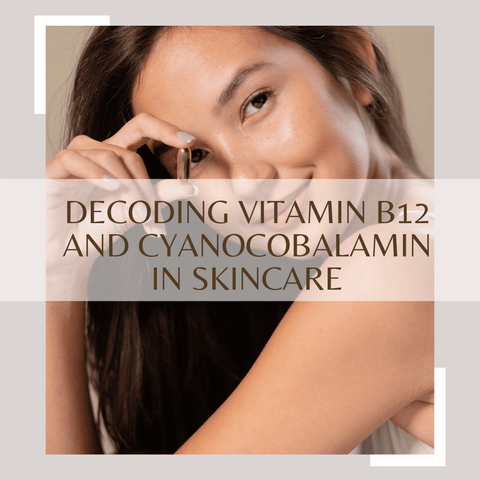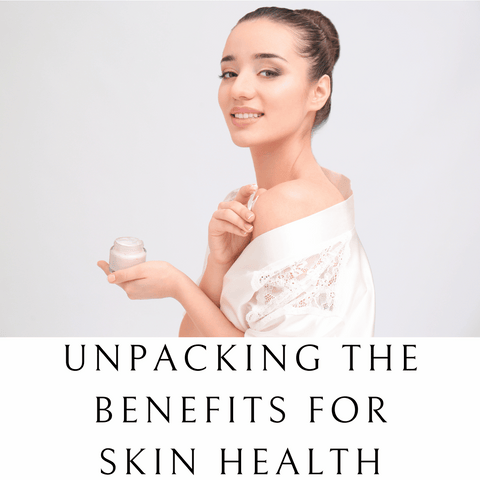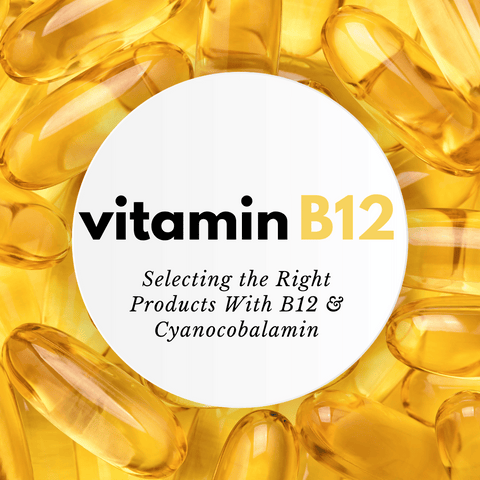Cyanocobalamin, often known as vitamin B12, is a necessary water-soluble vitamin that is important for many body processes, including the generation of red blood cells, DNA synthesis, and neuron function. Despite being well-known for its significance to general health, it has drawn considerable interest in the skincare sector due to its possible advantages. This blog explores the use of cyanocobalamin and vitamin B12 in skincare in more detail.
Decoding Vitamin B12 and Cyanocobalamin in Skincare

Cyanocobalamin, another name for vitamin B12, is a necessary nutrient that is important for many body processes. Although it is frequently linked to general health, it has also drawn considerable interest from the skincare sector. Let's examine their possible advantages and uses, such as their antioxidant capabilities, hydration, skin barrier function, hyperpigmentation and brightening, wound healing, and anti-inflammatory effects, to better understand the role of vitamin B12 and cyanocobalamin in skincare. Despite some encouraging research and anecdotal data, it is advised to seek professional advice for an efficient skincare plan because individual results may differ.
Introduction to Vitamin B12 & Cyanocobalamin
The water-soluble vitamin B12, also known as cyanocobalamin, is crucial for many bodily processes that are necessary for life. It is a B-vitamin and well-known for its significance to general health and well-being. This blog serves as an introduction to cyanocobalamin and vitamin B12. Cyanocobalamin, or vitamin B12, is a crucial component required for several body processes, such as DNA synthesis, the generation of blood cells, and neuron functioning. It is essential for sustaining general health and is supplied through dietary sources, primarily animal products. Supplements containing cyanocobalamin are frequently used to treat deficiencies and restore the body's vitamin B12 levels.
The Science Behind Their Skincare Importance
The role of vitamin B12 (cyanocobalamin) as a crucial nutrient and its potential advantages for skin health are at the heart of the evidence supporting its significance in skincare. Here's a closer look at the scientific justifications for its relevance in terms of skincare, such as its antioxidant capabilities, moisturising abilities, skin barrier function, ability to reduce hyperpigmentation and lighten skin, ability to heal wounds, and anti-inflammatory properties. Despite the fact that science supports these potential advantages, it's crucial to remember that different people may react differently to vitamin B12 in skincare products. Vitamin B12 in skincare products can be useful depending on the formulation, concentration, and individual skin demands. Maintaining a thorough skincare regimen that includes cleanliness, sun protection, and a healthy diet is also essential. Instead of being used as a stand-alone treatment for skin health, vitamin B12 should be taken into account as part of a larger plan. A dermatologist or other skincare expert can evaluate your skin type and any particular concerns you may have, provide personalised skincare advice, and help you choose the best products for your needs. This will enable you to make an informed choice about adding vitamin B12 or cyanocobalamin-based products to your routine.
Safety and Usage: What You Need to Know
To obtain the best results and reduce potential hazards, it's critical to know about safety and usage recommendations when considering skincare products that include vitamin B12 (cyanocobalamin). Some things you should know such conducting a patch test, getting professional advice, adhering to product instructions, refraining from excessive usage, combining with other skincare products, using sun protection, storing items carefully, keeping an eye out for allergic reactions, maintaining a healthy diet, and having patience. It is best to seek professional guidance if you have any reservations about using these products. You can maximise the benefits of vitamin B12 in your beauty routine while lowering hazards by being knowledgeable and implementing these precautions.
Unpacking the Benefits for Skin Health

When used in skincare products, vitamin B12, also known as cyanocobalamin, has a number of potential advantages for the health of the skin. These advantages stem from its function as a necessary nutrient and its impact on numerous facets of skin function. The potential benefits for skin health are listed below:
-
Antioxidant Protection: Vitamin B12 has antioxidant properties that aid in the neutralisation of free radicals that can harm skin cells. This protection can help reduce the signs of premature aging, such as wrinkles and fine lines, as well as maintain the skin's overall health.
-
Hydration and Moisture Retention: Healthy skin requires adequate hydration. Vitamin B12 can help to lock in moisture, resulting in more hydrated skin and a smoother, more supple complexion. It contributes to the preservation of the skin's natural moisture barrier.
-
Skin Barrier Strengthening: Vitamin B12 helps to improve the skin's barrier function, which is necessary for protecting the skin from external irritants, pollutants, and pathogens. A strong skin barrier contributes to healthy, resilient skin.
-
Even Skin Tone and Brightening: Vitamin B12 can assist in the reduction of hyperpigmentation and dark spots, resulting in a more even skin tone. It has the potential to regulate melanin production, the pigment responsible for skin color, which can result in a more radiant and bright complexion.
-
Wound Healing and Scar Reduction: Vitamin B12 is thought to aid the body's natural wound-healing processes. This has the potential to aid in the recovery of damaged or injured skin, including the reduction of scarring and blemishes.
-
Anti-Inflammatory Effects: Some research indicates that vitamin B12 may have anti-inflammatory properties. Inflammation is a factor in many skin conditions, including eczema and psoriasis. As a result, vitamin B12 may aid in the management of these conditions by decreasing inflammation and associated symptoms.
-
Overall Skin Health: Vitamin B12 is necessary for overall skin health because it participates in cellular processes that affect the appearance, texture, and resilience of the skin. A well-nourished skin cell will perform optimally and contribute to overall healthier skin.
The success of skincare products containing vitamin B12 relies on a variety of factors, including the formulation, concentration, and an individual's particular skin needs. It is important to remember that while science supports these potential benefits, individual responses may vary. If you want to get the most out of vitamin B12 for skin health, think about incorporating it into a full skincare regimen that also includes regular cleansing, sun protection, and a healthy diet. Consult with a dermatologist or skincare specialist for individualised advice if you have particular skin issues or are unsure of how to incorporate these items.
Energizing and Revitalizing Your Skin
Energising and revitalising your skin is critical for maintaining a healthy, youthful appearance. To accomplish this, you can incorporate various skincare practises and products into your routine. Here are some suggestions to help you rejuvenate your skin:
-
Cleansing: Begin by removing dirt, makeup, and impurities with a gentle cleanser appropriate for your skin type. Cleanse your face twice a day, in the morning and before bedtime, to keep a clean canvas for skincare products.
-
Exfoliation: Exfoliation on a regular basis aids in the removal of dead skin cells, resulting in a more radiant complexion. Choose a suitable exfoliant based on your skin type: physical exfoliants (scrubs) or chemical exfoliants (with AHAs or BHAs).
-
Hydration: Hydration is essential for revitalised skin. To keep your skin's natural moisture balance, use a moisturiser that is appropriate for your skin type. Consider using a hydrating serum or face oil to add moisture.
-
Sun Protection: Sunscreen is an essential part of your skincare routine. It shields your skin from UV rays, thereby preventing premature aging and skin damage.
-
Vitamin C Serums: Vitamin C serums can help brighten and energise your skin while also protecting it from free radicals.
-
Retinoids: Retinoids (retinol) can enhance skin texture, minimise the look of fine lines, and encourage the production of collagen.
-
Antioxidants: To protect your skin from free radical damage, use products containing antioxidants such as vitamin E, green tea extract, and resveratrol.
-
Hyaluronic Acid: Hyaluronic acid helps to retain moisture in the skin, keeping it plump and hydrated.
-
Face Masks: Incorporate revitalising face masks into your skincare routine. Choose masks that address specific skin issues, such as hydrating, brightening, or anti-aging.
-
Proper Diet and Hydration: Consume a healthy diet that is high in vitamins, minerals, and antioxidants. Keep your skin hydrated from the inside out by drinking plenty of water.
-
Sleep and Stress Management: Get enough sleep to allow your skin to repair and rejuvenate. Manage your stress because it can contribute to skin problems. Yoga, meditation, and relaxation techniques can all be beneficial.
-
Professional Skincare Treatments: Consider professional skin rejuvenation treatments such as facials, chemical peels, microdermabrasion, or laser therapy.
-
Consistency: In the world of skincare, consistency is everything. Maintain your routine and be patient, as significant results may take time to appear.
-
Consult a Dermatologist: Consult a dermatologist for personalised advice and treatment options if you have specific skin concerns.
Keep in mind that everyone's skin is different, so tailor your skincare routine to your specific needs and concerns. Furthermore, gradually introducing new products can assist you in determining which ingredients work best for your skin without irritating it.
The Duo’s Role in Combating Aging Signs
The anti-aging effects of vitamin B12 (cyanocobalamin) and skincare products containing this vitamin include antioxidant defence, skin hydration, support for skin barrier function, skin brightness and evenness, wound healing and scar reduction, and anti-inflammatory effects. While vitamin B12 may play some of these roles in reducing aging symptoms, it's vital to keep in mind that everyone's body may react differently to skincare products. The efficacy of vitamin B12-based products is affected by formulation, concentration, and each individual's unique skin needs. Integrating vitamin B12 products into a comprehensive skincare routine that includes regular cleansing, sun protection, and a balanced diet is recommended for a well-rounded approach to combating aging signs. A dermatologist or skincare professional can give you personalised advice on incorporating vitamin B12 products into your routine and addressing specific aging concerns.
Addressing Acne and Sensitivities Effectively
Acne and sensitivities can be difficult to manage in your skincare routine, but with the right approach, you can effectively manage both. Here are some pointers to keep your skin clear and healthy while reducing sensitivity:
-
Choose Gentle Cleansers: Use a gentle, fragrance-free cleanser to avoid stripping your skin's natural oils. Look for products that say they are good for sensitive skin.
-
Avoid Harsh Ingredients: Avoid skincare products that contain harsh ingredients such as alcohol, fragrance, or strong acids, as these can irritate sensitive skin and aggravate acne.
-
Acne Treatment with Salicylic Acid or Benzoyl Peroxide: If you have acne-prone skin, consider using products containing salicylic acid or benzoyl peroxide. These can aid in the unclogging of pores and the reduction of acne breakouts.
-
Patch Test New Products: Before introducing new skincare products into your routine, always perform a patch test. This assists you in identifying any potential allergies or sensitivities.
-
Moisturising and hydration: Even if you have oily or acne-prone skin, moisturise with a lightweight, non-comedogenic (will not clog pores) product to keep skin balanced and prevent dryness.
-
Sunscreen: Use a broad-spectrum sunscreen with an SPF of 30 or higher to protect your skin from UV damage. Choose a formula that is suitable for sensitive skin.
-
Over-Exfoliation: Excessive exfoliation can aggravate sensitivities. Limit exfoliation to 2-3 times per week, and use a gentle exfoliant.
-
Consult a Dermatologist: If your acne or skin sensitivities are severe or persistent, seek professional advice and potential prescription treatments from a dermatologist.
-
Acne Spot Treatment: To target specific acne breakouts, use spot treatments containing benzoyl peroxide or salicylic acid, but avoid applying them to sensitive areas.
-
Acne Medications Should Be Used With Caution: Some prescription acne medications can be harsh on the skin. Follow your dermatologist's instructions and keep an eye out for sensitivities.
-
Diet and Hydration: A healthy diet and adequate hydration are essential for healthy skin. Acne and sensitivities can both benefit from antioxidant-rich foods and hydration from water.
-
Stress Management: Excessive stress can aggravate acne and skin sensitivities. Engage in stress-reduction techniques such as meditation, yoga, or deep breathing exercises.
-
Avoid Touching and Picking: Avoid touching or picking at your acne because it can cause additional irritation, scarring, and the spread of bacteria.
Customise your skincare routine to your specific skin needs, and be patient, as results may take time. If you have persistent or severe acne and sensitivities, you should see a dermatologist for a personalised treatment plan. They can recommend targeted treatments that address both issues effectively and safely.
Selecting the Right Products With B12 & Cyanocobalamin

When choosing vitamin B12 (cyanocobalamin) skincare products, it is critical to consider your skin type, specific concerns, and preferences to ensure you get the right products for your needs. Here's a step-by-step guide to help you choose the best products:
-
Determine Your Skin Type: Determine whether your skin is oily, dry, combination, sensitive, or normal. Your skin type influences the types of products that will work best for you.
-
Understand Your Skin Issues: Examine your specific skin issues, such as acne, signs of aging, sensitivity, or hyperpigmentation. Knowing your main concerns will help you choose products that address them.
-
Examine the Product Labels: Look for products that clearly state in the ingredient list that they contain vitamin B12 or cyanocobalamin. Check the concentration, as higher concentrations may be more effective but may also cause irritation in people with sensitive skin.
-
Select the Best Formulation: Choose products that are appropriate for your skin type and concerns. If you have dry skin, choose a moisturising cream or serum, whereas those with oily skin should choose a lightweight serum or gel.
-
Look for Other Beneficial Ingredients: Depending on your skin concerns and goals, look for products that contain complementary ingredients such as antioxidants (vitamin C, vitamin E), hyaluronic acid, or retinol.
-
Examine Product Reviews and Recommendations: Investigate online reviews and recommendations from reputable sources to learn how well the product has worked for others with similar skin concerns.
-
Patch Test: Before using the product on your face, perform a patch test by applying a small amount to a discreet area of your skin (e.g., behind your ear) to check for any adverse reactions.
-
Consult a Dermatologist or Skincare Professional: Seek professional help if you have specific skin concerns or are unsure about which products to use. A dermatologist or skincare expert can make tailored recommendations based on your skin's specific requirements.
-
Maintain a Comprehensive Skincare Routine: Make sure vitamin B12 products are part of your overall skincare routine. In addition to your chosen B12 products, a complete routine should include cleansing, exfoliation, moisturising, and sun protection.
-
Monitor Results: Be patient and conscientious about your skincare routine. It may take some time to see the full benefits of a product, so keep an eye on your skin's reaction and make adjustments as needed.
Keep in mind that not every product works the same way for everyone. What works well for one person may not have the same effect on another due to individual variations in skin type and sensitivity. By following these guidelines and customising your skincare routine, you can effectively choose the right vitamin B12 products to address your specific skin needs.
Reading and Understanding Ingredient Lists
Making educated decisions about the skincare products you use on your skin requires the ability to read and comprehend ingredient lists for skincare products. Here is a step-by-step guide on how to read and understand ingredient lists for skincare products, including the following: Start with the fundamentals, ingredients are listed in descending order; become familiar with common ingredient categories; look for active ingredients; beware of fragrances and allergens; avoid harmful ingredients; consider concentration; pay attention to water content; research ingredients; watch for clusters; consider your skin type and concerns; and patch test new products. It enables you to select goods that are ideal for the particular requirements and preferences of your skin.
Identifying Quality in B12-Infused Skincare Products
Identifying quality in B12-infused skincare products entails looking for specific characteristics that ensure the product is effective, safe, and beneficial to your skin. Here are some important factors to consider when evaluating the quality of B12 skincare products:
-
Transparent Ingredient List: A quality product should have a clear and transparent ingredient list that indicates the presence of cyanocobalamin (vitamin B12) in an appropriate concentration.
-
Product Reputation and Brand Credibility: Buy from reputable and established brands that have a track record of producing high-quality skincare products.
-
Packaging and preservation: High-quality products are packaged in containers that shield the product from light and air, which can degrade active ingredients like B12. Choose pumps or droppers with little or no air exposure and opaque or dark containers.
-
B12 concentration: Ensure that the vitamin B12 concentration is adequate for the product's intended use. The higher it appears on the ingredient list, the more prevalent it is in the product.
-
Absorption and Delivery System: To ensure better absorption into the skin, effective B12 skincare products frequently employ advanced delivery systems such as microencapsulation, liposomes, or nanotechnology.
-
Additional Beneficial Ingredients: Look for products that contain additional beneficial ingredients that complement the effects of B12, such as antioxidants, hyaluronic acid, peptides, or natural extracts.
-
Avoid Potentially Harmful Ingredients: Check to see if the product contains potentially harmful ingredients such as parabens, sulphates, synthetic fragrances, and other known irritants.
-
Clinical Testing and Efficacy: High-quality products may have been subjected to clinical testing to demonstrate their efficacy and safety. Look for products that have demonstrated success in addressing specific skin concerns.
-
Product Reviews and Recommendations: Read product reviews and recommendations from reputable sources, such as dermatologists, skincare professionals, or reputable beauty bloggers, to learn how well the product works for others.
-
Expiration Date: Look for the product's expiration date to ensure it is still fresh and effective. Using an expired product may not produce the desired results.
-
Ethical and Sustainable Practises: Look for products from brands that prioritise ethical and sustainable practises, such as cruelty-free testing and environmentally responsible packaging.
-
Patch Test: Before using the product on your face, perform a patch test by applying a small amount to a discreet area of your skin to check for any adverse reactions.
-
Consultation with a Dermatologist or Skincare Expert: If you have specific skin concerns or are unsure which B12-infused product is best for your skin, consult with a dermatologist or skincare expert for personalised advice.
Tips for Incorporating into Your Routine
Including B12-infused skincare products in your routine can help you treat certain skin issues and improve the health of your skin as a whole. Identification of your skin concerns, a patch test, reading the directions, cleansing, exfoliation, B12 application, waiting for absorption, layering with other products, sunscreen, consistency is key, monitoring and adjusting, expert advice, and a gradual introduction are some tips for successfully incorporating these products into your skincare routine. You can get the most out of skincare products containing B12 by using these suggestions and sticking to a regular routine, which will help you properly handle your individual skin difficulties.
Addressing Common Questions and Myths

It can be helpful to dispel any misunderstandings and give customers useful information by addressing frequent queries and myths regarding skincare, particularly in the context of B12-infused products. the following myths and commonly asked questions
Commonly Asked Questions:
-
Is Vitamin B12 Safe for My Skin? Yes, when used in skincare products, vitamin B12 (cyanocobalamin) is generally safe for the skin. It is non-toxic and water-soluble. However, people with allergies or sensitivities should conduct a patch test and keep an eye out for any negative side effects.
-
Will B12 increase the sensitivity of my skin to the sun? Vitamin B12 itself does not increase skin sensitivity to the sun. However, some skincare products containing B12 can be used in the morning, so it is important to use sunscreen to protect your skin from UV rays.
-
Is B12 Capable of Reversing Aging Symptoms? B12, an antioxidant and necessary nutrient, may help to maintain healthier, younger-looking skin. However, it may not be sufficient to reverse advanced signs of aging on its own. It is frequently more effective when combined with other anti-aging ingredients.
-
Can I Combine B12 Skincare Products with Other Ingredients? Yes, B12 products can be combined with other skincare ingredients. However, when combining them with active ingredients such as vitamin C or strong acids, use caution because compatibility can vary.
-
Is Vitamin B12 Beneficial for Acne-Prone Skin? The wound-healing abilities of B12 and its potential anti-inflammatory effects make it useful for acne-prone skin. It may help to reduce the appearance of acne scars and inflammation.
Myths:
-
Higher Concentration Equals Better Results: Higher B12 concentrations are not always preferable. The effectiveness of a product is determined by a variety of factors, including formulation and skin type. Higher concentrations may not be suitable for everyone and, in some cases, may irritate.
-
B12 Alone Will Eliminate Wrinkles: While B12 may have anti-aging properties, it is not a miracle cure for wrinkles. A comprehensive approach, including other anti-aging ingredients and habits such as sunscreen, is required to effectively address wrinkles.
-
B12 Is a Miracle Cure for All Skin Issues: While B12 can be beneficial to the skin, it is not a cure-all for all skin problems. Specific concerns and individual factors influence the effectiveness of B12 supplements.
-
B12 Can Replace a Balanced Diet: Topical B12 products can supplement a healthy diet but should not be used in place of proper nutrition. A well-balanced diet is essential for good skin health.
-
B12 Can Only Be Used in the Evening: Depending on the exact directions for the product, B12 products can be used in both morning and evening skincare regimens. When utilising B12 supplements, sunscreen must be applied first thing in the morning.
People can choose to use B12-infused skincare products in their routines and understand the potential advantages and restrictions of these products by having these questions answered and common misconceptions debunked.
Tackling Concerns Over Efficacy and Safety
Concerns about the efficacy and safety of skincare products, including those containing B12 (cyanocobalamin), must be addressed in order to make informed decisions. Here are some approaches to addressing these concerns:
-
Concerns about effectiveness, such as conducting research and education on your own, consulting a dermatologist, patch testing, and adhering to a skincare routine.
-
Reading the ingredient list, patch testing, seeing a dermatologist, avoiding overuse, selecting dependable products, staying informed, watching for negative reactions, being aware of your sensitivities, considering fragrance-free options, and allergy testing are all recommended safety precautions.
By systematically addressing concerns about efficacy and safety and staying informed, you can make informed decisions about skincare products, including those containing B12, and prioritise the health and well-being of your skin.
Demystifying Myths Around Vitamin B12 in Skincare
Confusion might result from myths and misconceptions regarding the use of vitamin B12 (cyanocobalamin) in cosmetics. Let's dispel some common misconceptions about vitamin B12 in skincare, such as the claims that it can treat all skin problems on its own, that it can treat acne, that a higher concentration will produce better results, that it can replace a healthy diet and sunscreen, that it can reverse advanced signs of aging, that all B12 products are the same, and that it can take the place of professional skincare treatments. It's crucial to be aware of the potential advantages and restrictions of B12 in skincare and to utilise it in a sensible and balanced way.
































